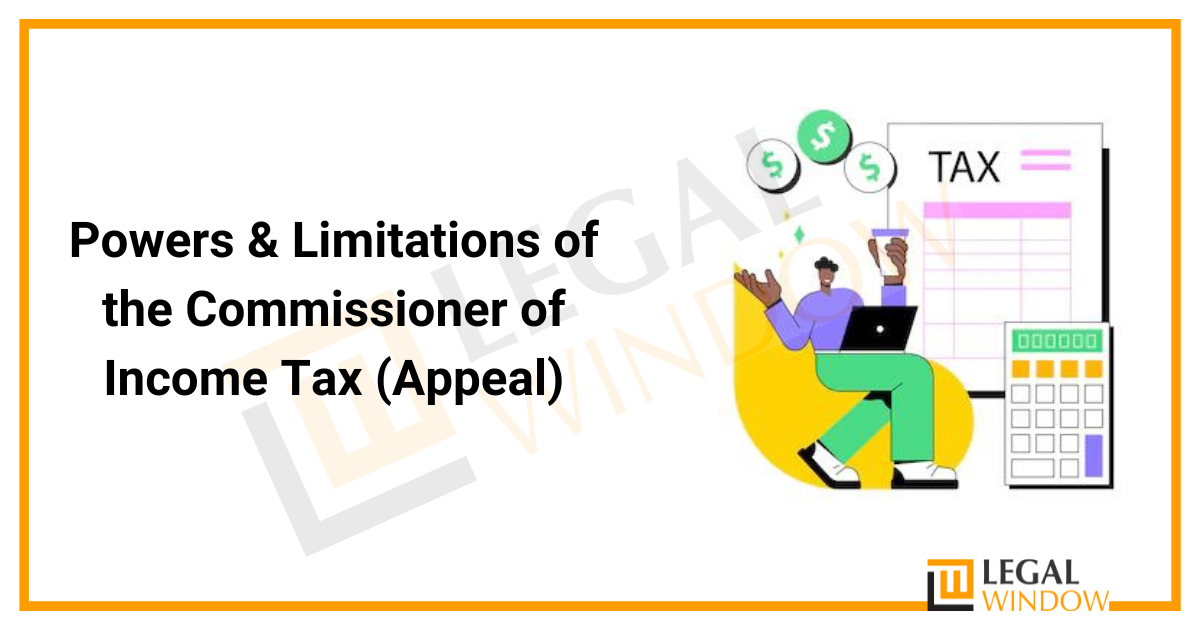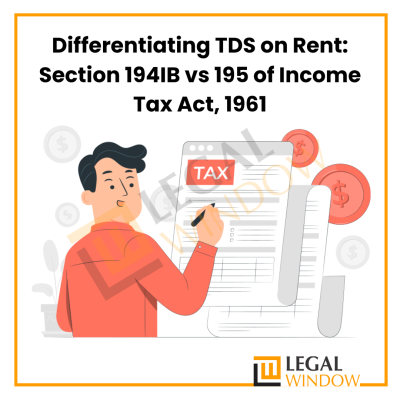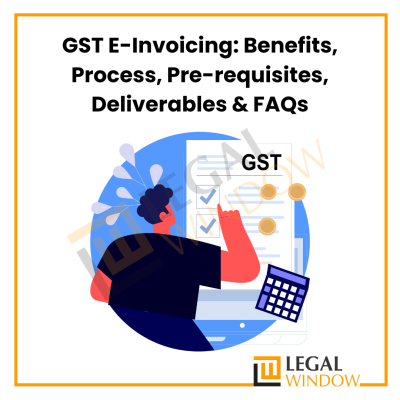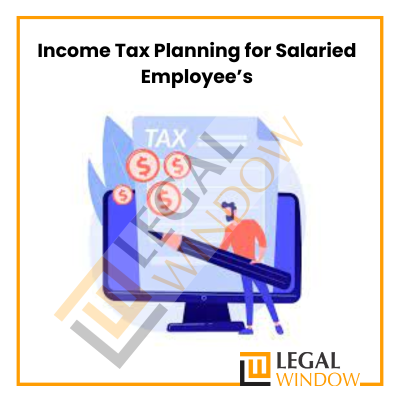Powers & Limitations of the Commissioner of Income Tax (Appeal)
- October 29, 2022
- Income Tax
 For effective financial management, it is essential to understand the functioning, powers, and limitations of the powers of the tax authorities. This turns out to be all the more important in the light of the present scenario in India where there is uncertainty in the minds of the assessee as to the power that these authorities can exercise and where there have been several cases of misuse of these discretionary powers resulting in contravening the statutory provisions, which has acquired binding effect supersedes the authoritative pronouncement of the higher judiciary and disrupts the constitutionally mandated effect of the pronouncement of the Supreme Court under Article 141.
For effective financial management, it is essential to understand the functioning, powers, and limitations of the powers of the tax authorities. This turns out to be all the more important in the light of the present scenario in India where there is uncertainty in the minds of the assessee as to the power that these authorities can exercise and where there have been several cases of misuse of these discretionary powers resulting in contravening the statutory provisions, which has acquired binding effect supersedes the authoritative pronouncement of the higher judiciary and disrupts the constitutionally mandated effect of the pronouncement of the Supreme Court under Article 141.
It explains simply the various tax authorities established under the Income Tax Act, 1961(Act) the Central Board of Direct Taxes and its powers, the powers of other tax authorities of income, the jurisdiction of income tax authorities, and their persuasive analysis to enable a comprehensive understanding of the functioning of financial authorities for financial management.
In this article, let us have a look at the powers & limitations of the Commissioner of Income Tax (Appeal) (hereinafter, referred to as CIT (A)).
| Table of Contents |
Commissioner of Income Tax
The Chief Commissioner of Income Tax is generally appointed by the Indian Revenue Service and serves the government for 30 years. A new designation is generated as a result of cadre reorganization. The Principal Chief Commissioner of Income Tax and the senior-most Chief Commissioners of Income Tax are elevated to this grade and are given greater duties in terms of personnel and financial objectives. Special Secretary is their comparable rank at the Union Secretariat.
Chief Commissioners are in charge of the department’s activities within an area, which normally overlaps with the territory of a state. Their numbers range from 16 to 3 depending on the location. The Central Board of Direct Taxes assigns Chief Commissioners financial objectives for collection, which are distributed among Income Tax Commissioners and continuously checked.
Meaning of Appeal
Appeals lie before the CIT (A) against the appealable orders under Section 246A of the Act and the appellate proceedings before the CIT (A) and the powers of the CIT (A) are governed by Sections 250 and 251 of the Act respectively. Section 250 lays down the procedure for appeal before the Appellate Authority against the orders of the Assessing Officer. The Appellate Body has been named differently in the statute from time to time. Originally the Appellate Authority was described as Appellate Assistant Commissioner at the relevant time and now as Commissioner of Income Tax (Appeal).
The first appeal against the order of the Assessing Officer is to the Commissioner (Appeals) and can be filed only by the assessee.
An assessee or any deductor or any collector who has been aggrieved by orders (such as orders passed under sections 147, 144, 143(3), etc.) passed by any Income Tax Authority may file his first appeal to the Commissioner u/s 246A Income Tax Act, 1961.
Form of Appeal and Limitation (Section 249 and Rules 45 and 46)
- Form: An appeal to the Commissioner (appeal) is made on Form 35.
- Method of submitting an appeal:
-
- By submitting the form electronically under a digital signature if the Income Tax Return is filed under a digital signature.
- By submitting the form electronically through an electronic verification code in a case not covered by sub-clause (a).
- If the assessee can submit a return in paper form, he can use both the submission options in paper form or electronically.
-
Powers of the Commissioners of Income Tax
Commissioners are appointed by the central government. They are generally appointed to head the income tax administration in a particular area. As the head of the administration, the Commissioner of Income Tax has certain administrative as well as judicial powers. The Commissioner may exercise the powers of an Assessing Officer. He has the power to transfer any case from one or more Assessing Officers to any other Assessing Officer. He may grant consent to the order passed by the Assessing Officer. Prior approval is required to reopen an assessment. Apart from many other powers mentioned in the Income Tax Act, of 1961, it also has the power to revise the order passed by the Assessing Officer.
Powers of the Commissioner (Appeals)
The Central Government appoints the Commissioners of Income Tax (Appeals). It is an appellate body that has the following judicial powers:
- Power relating to discovery, production of evidence, etc.
- Ability to call information.
- Power to inspect Company Registers.
- Option to offset refunds against remaining tax payable.
- Authority to handle appeals.
- Power to impose a penalty.
Let us have a look at them in a bit of detail-
- The legislature has conferred very wide powers on the Appellate Commissioner once an appeal is preferred by the assessee.
- An appeal is only a new hearing or renewal of proceedings. In the absence of any statutory bar or limitation, the CIT (A) has the same powers, exercisable or in the same manner and to the same extent as the AO in the first instance.
- The powers of CIT (A) are re-examination and once a writ is placed before CIT (A), its capabilities are not limited to examining only those aspects of the assessment complained of by the assessee, but its powers extend to the entire extent. The assessment is to be corrected by the AO not only about the matter raised by the assessee in appeal but also about any other matter he considered and determined during the assessment.
- According to Section 250 (4) of the Income Tax Act, CIT (A) is authorized to carry out further investigations that it deems appropriate or to arrange further investigations by an income tax investigator in custody. Furthermore, he is entitled to carry out this new assessment and, where appropriate, determine the amount of tax payable based on this new assessment. (Patna High Court dated- 28th July 1955).
- The powers of the CIT (A) have not limited to those points against which the assessee has a grievance but may consider those points with which the assessee is satisfied and order improvement in the assessment.
- If the subject matter of the AO’s assessment is income and even though the AO may have come to the conclusion that that income is not taxable, still it would be for CIT (A) to take a different view and make that income taxable.
Limitation on powers of Commissioner (Appeals)
The following are the limitation on the powers of the Commissioner (Appeals):
- It is only the assessee who has the right to prefer an appeal against the assessment order passed by the AO. If the assessee does not choose to appeal, the assessment order becomes final subject to any power of revision that the Commissioner may have under Section 263 of the Income Tax Act, 1961.
- If the assessee chooses to be satisfied with the order of the AO, there is nothing CIT (A) can do, however erroneous the assessment may be.
- Even in the case where CIT (A) wants to exercise authority for improvement, according to Section 251, sub-section 2 of the Act, this authorization must be exercised after the submission of a call for improvement, which provides a reasonable opportunity to prove the cause and not in the absence of such notification.
- Department cannot prefer an appeal against the assessment order of AO to CIT (A). If an error etc. is noted in the order, the department has only 3 options to choose from,
-
- Rectification u/s 154,
- Reassessment u/s 147 or,
- Review of the order u/s 263.
-
- This provision itself indicates that even if the appellate authority wants to process a new source of income that is part of either the return of income or the assessment order but has not been challenged in appeal before the appellate authority, the Appellate Authority must give a reasonable opportunity of being heard before processing such source of income and raising the assessment.
- The subject of the appeal is an assessment and the subject of the appeal limits the scope of the appeal. CIT (A) does not have the authority to travel beyond the scope of the appraisal report and is not authorized to assess new sources of income. This would not be an improvement to the assessment, but rather the addition of a new assessment to the old assessment, the subject of which is different. (Jagarnath Therani Patna High Court, 15 January 1925)
- However, CIT (A) has no option to introduce a new source of income into the assessment. It must be limited to those incomes that were the subject of the original assessment.
- In fact with effect from 1st June 2001 the power of the CIT (A) is to set aside the order of the Assessing Officer and return the same to the Assessing Officer to pass a fresh order.
- In the absence of any statutory general principle regarding the scope of the powers of the CIT (A) is that these powers are identical to those of the original authority. In the absence of any statutory provision, the appellate body is vested with all the plenary powers that a subordinate body may have in a given matter.
- Given Section 250(6) of the Act, CIT (A) has no jurisdiction to dismiss the appeal on the ground of non-prosecution. The section provides that the order of the CIT (A) must be in writing and shall state the points for determination and pass a decision thereon, failing which the order of the CIT (A) may be quashed.
 Final words
Final words
Only if CIT (A) had a duty to review the correctness of the entire assessment irrespective of the grounds of appeal raised by the assessee could it be urged that CIT (A) should be deemed to have reviewed the correctness of the Tribunal’s decision. AO so far as the dismissal of the third suit is concerned, and as he has not altered the said decision, he is to be deemed to have accepted it as correct.
Connect to more Legal Window if you want more insights regarding the Powers and Limitations of the Commissioner of Income Tax.
CA Pulkit Goyal, is a fellow member of the Institute of Chartered Accountants of India (ICAI) having 10 years of experience in the profession of Chartered Accountancy and thorough understanding of the corporate as well as non-corporate entities taxation system. His core area of practice is foreign company taxation which has given him an edge in analytical thinking & executing assignments with a unique perspective. He has worked as a consultant with professionally managed corporates. He has experience of writing in different areas and keep at pace with the latest changes and analyze the different implications of various provisions of the act.
Categories
- Agreement Drafting (23)
- Annual Compliance (11)
- Change in Business (36)
- Company Law (148)
- Compliance (90)
- Digital Banking (3)
- Drug License (3)
- FEMA (17)
- Finance Company (42)
- Foreign Taxation (6)
- FSSAI License/Registration (14)
- GST (120)
- Hallmark Registration (1)
- Income Tax (202)
- Latest News (34)
- Miscellaneous (165)
- NBFC Registration (8)
- NGO (14)
- SEBI Registration (6)
- Section 8 Company (7)
- Start and manage a business (21)
- Startup/ Registration (130)
- Trademark Registration/IPR (40)
Recent Posts
About us
LegalWindow.in is a professional technology driven platform of multidisciplined experts like CA/CS/Lawyers spanning with an aim to provide concrete solution to individuals, start-ups and other business organisation by maximising their growth at an affordable cost.








